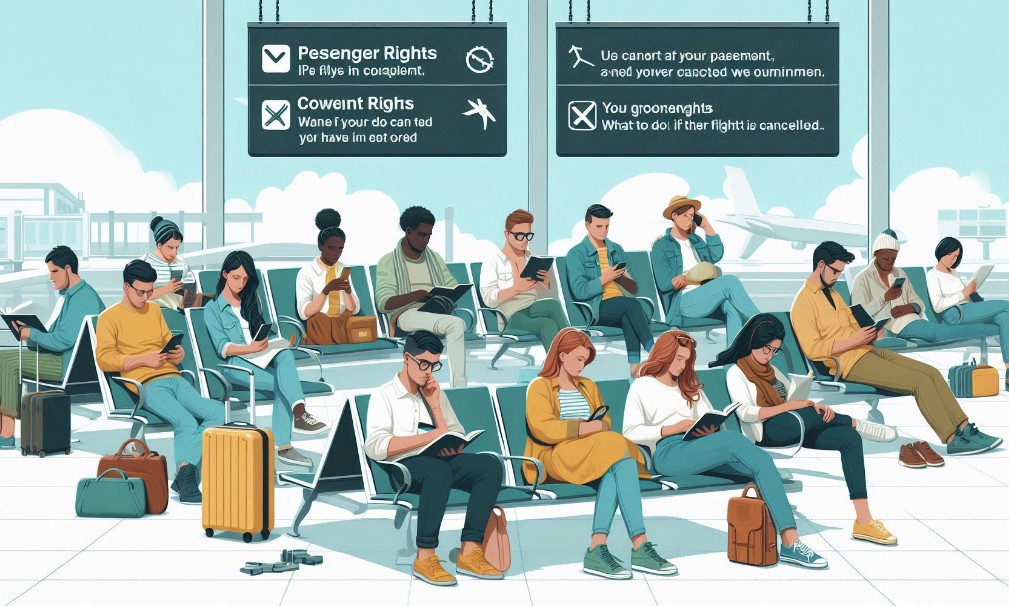Flight cancellations can be a frustrating and stressful experience for passengers. Understanding your rights and knowing the steps to take can help you navigate this challenging situation with greater ease. This guide provides essential information on what to do if your flight is cancelled, ensuring you are well-prepared to handle any disruptions to your travel plans.
First and foremost, it's important to know that you have certain rights as a passenger when your flight is cancelled. These rights can vary depending on the airline and the jurisdiction you are in, but there are some common protections in place globally. By familiarizing yourself with these rights, you can ensure that you receive the compensation and assistance you are entitled to.
When faced with a cancelled flight, the initial step is to contact your airline. Airlines are required to offer alternative arrangements or refunds in the event of a cancellation. You may be offered a seat on the next available flight or given the option to rebook for a later date. In some cases, airlines may also provide accommodation, meals, and transportation if the delay extends overnight.
It is also beneficial to be aware of any additional compensation you may be entitled to. For example, in the European Union, passengers may be eligible for compensation under EU Regulation 261/2004 if their flight is cancelled within 14 days of the scheduled departure. Similar regulations exist in other regions, offering financial recompense for significant disruptions.
Lastly, keep all your travel documents and receipts. These will be necessary if you need to make a claim for compensation or reimbursement. Detailed records of your communications with the airline can also support your case if there are disputes about your entitlements.
In conclusion, while a cancelled flight can disrupt your plans, knowing your rights and the appropriate actions to take can mitigate the impact. Stay informed, act promptly, and ensure you receive the support and compensation you deserve.

Passenger Rights: What to Do If Your Flight Is Cancelled
Flight cancellations can be a major inconvenience, but understanding your rights as a passenger can help you navigate the situation more effectively. Here’s a guide on what steps to take if your flight is cancelled.
Know Your Rights
Firstly, it’s important to be aware of your rights. In many regions, airlines are legally required to offer certain compensations or assistance when a flight is cancelled. For instance, in the European Union, under EC Regulation 261/2004, passengers may be entitled to compensation ranging from €250 to €600 depending on the flight distance and delay length.
Additionally, airlines must offer either a full refund or an alternative flight to your destination. If you choose an alternative flight, the airline should provide care, which includes meals, refreshments, and accommodation if necessary.
Steps to Take Immediately
Once you are informed that your flight is cancelled, follow these steps:
1. Contact the Airline: Approach the airline’s customer service desk or call their helpline. They can provide you with information on rebooking options or refunds.
2. Keep Receipts: If you incur any expenses due to the cancellation, such as for meals or accommodation, keep all receipts. These might be reimbursed by the airline.
3. Check Your Travel Insurance: Review your travel insurance policy to see if it covers flight cancellations. Some insurance plans offer additional compensation or cover expenses that the airline does not.
By understanding your rights and taking prompt action, you can manage the inconvenience of a flight cancellation more smoothly. Remember to stay calm and assertive, ensuring you receive the assistance and compensation you are entitled to.

Understanding Airline Responsibilities in Case of Cancellations
When an airline cancels a flight, passengers are often left wondering what their rights are and what they can expect from the airline. Understanding airline responsibilities in these situations can help you navigate the challenges more effectively and ensure that you receive the assistance you are entitled to.
Firstly, airlines are generally required to inform passengers of a flight cancellation as soon as possible. This notification is typically provided through the contact information you supplied when booking the flight. The earlier the notice, the more options you might have to rearrange your travel plans.
In the event of a cancellation, airlines must offer you a choice between a refund or re-routing. A refund should be processed within seven days, and this applies whether the ticket is part of a round-trip or a one-way flight. If you choose re-routing, the airline must find you an alternative flight to your destination at the earliest opportunity. This includes arranging flights on different airlines if necessary.
Moreover, airlines have obligations to provide care to passengers while they await their new flight. This care often includes meals and refreshments, accommodation if an overnight stay is required, and transportation between the airport and the place of accommodation. The specific provisions can vary depending on the length of the delay and the time of day.
Additionally, compensation might be available depending on the circumstances surrounding the cancellation. For instance, if the cancellation is due to factors within the airline's control, such as technical issues or staffing problems, passengers may be entitled to compensation. However, if the cancellation is caused by extraordinary circumstances such as severe weather or security risks, the airline may be exempt from paying compensation.
It is also important to keep all receipts and records of your expenses incurred due to the cancellation, as these can be useful if you need to make a claim for reimbursement. Airlines often have specific procedures for handling claims, and adhering to these can expedite the process.
In conclusion, knowing your rights and the responsibilities of the airline in case of a flight cancellation can significantly mitigate the stress and inconvenience. Always check the specific terms and conditions of your airline, as these can provide additional insights into their policies and procedures.

Compensation and Refunds: How to Claim Them
When your flight is cancelled, you may be entitled to compensation or a refund, depending on the circumstances. Here's how you can claim what you're entitled to:
Firstly, it is important to understand the regulations that apply to your flight. For flights departing from or arriving in the EU, the EU Regulation 261/2004 provides specific rights. Other countries may have their own rules. Always check the local regulations.
| Eligibility | Compensation Amount |
|---|---|
| Flights under 1,500 km | €250 |
| Flights between 1,500 km and 3,500 km | €400 |
| Flights over 3,500 km | €600 |
To claim compensation, follow these steps:
- Contact the airline: Immediately reach out to the airline's customer service to inquire about your rights and request compensation.
- Keep all documents: Retain your boarding pass, booking confirmation, and any receipts for additional expenses incurred due to the cancellation.
- Fill out a compensation form: Many airlines have online forms specifically for compensation claims. Fill these out thoroughly and attach all necessary documents.
- Know your rights: Reference the relevant regulation or law that applies to your flight when making your claim.
If the airline does not respond or denies your claim, you have other options:
- Escalate the claim: File a complaint with the national enforcement body or aviation authority in the country where the incident occurred.
- Seek legal advice: Consider consulting a lawyer who specializes in travel law if your claim is substantial.
- Use third-party services: There are companies that can help you claim compensation for a fee.
For refunds, the process is similar:
- Request a refund: Contact the airline and request a full refund if your flight is cancelled. This should include the cost of the ticket and any additional services purchased.
- Understand the terms: Review the airline's cancellation policy and any applicable regulations to ensure you are aware of your rights.
- Follow up: If the refund is not processed in a timely manner, follow up with the airline's customer service department.
Being proactive and informed can significantly increase your chances of successfully claiming compensation or a refund after a flight cancellation.
